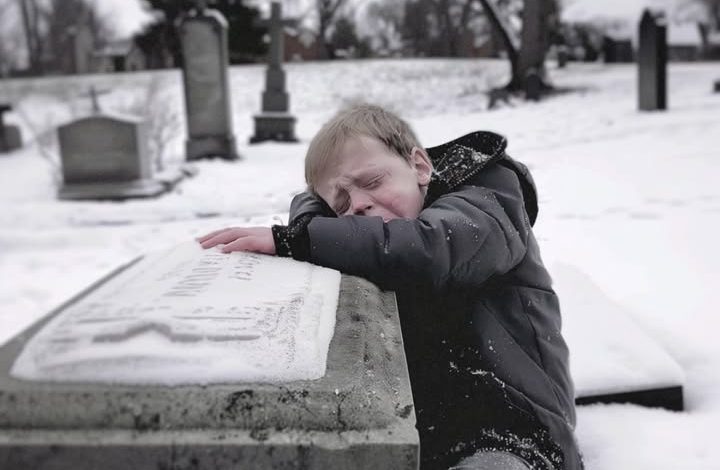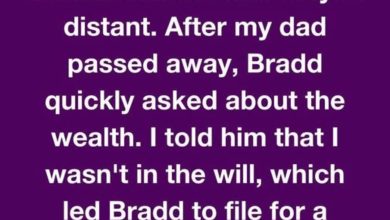My Dad Urgently Called My Brother and Me: ‘Something Strange Is Happening to Your Mom — Come Save Her’

The idyllic Sunday afternoon shattered into a thousand pieces for the Wesenberg family. A chilling silence descended upon their backyard as they discovered their youngest son, Ted, lifeless in the swimming pool. The vibrant laughter that once echoed through their home was replaced by the somber hum of grief.
Paul, the father, dove into the pool with a desperate hope that defied logic. He pulled Ted’s limp body from the water, the weight of the tragedy crushing his spirit. Despite frantic efforts to revive him, the paramedics arrived too late. Ted, their beloved son, was gone.
The funeral was a blur of somber faces and whispered condolences. Linda, Ted’s mother, remained frozen in a state of disbelief, her mind trapped in an endless loop of “what ifs.” The days that followed were a torturous descent into despair. Grief, like a venomous serpent, slithered into their home, poisoning their relationships and leaving a trail of bitterness and blame in its wake.
A House Divided by Sorrow
The once-harmonious Wesenberg household transformed into a battlefield of accusations. Paul and Linda, consumed by their own pain, became entangled in a destructive cycle of blame. Their surviving son, Clark, a sensitive child of six, became an unwitting casualty of their emotional turmoil.
Each night, Clark would lie awake, his teddy bear clutched tightly against his chest, as his parents’ bitter arguments echoed through the house. He yearned for the comforting bedtime stories, the playful wrestling matches with his father, and the warm, loving embrace of his mother. These cherished memories now felt like distant echoes of a happier past.
The loss of Ted created a gaping hole in Clark’s life. His mother, consumed by sorrow, retreated into a shell of grief, neglecting her household duties. His father, struggling to cope with his own grief and the added responsibility of running a household, often burnt breakfast and served meals that lacked the love and warmth of his mother’s cooking. Clark, feeling invisible and forgotten, retreated into silence, his pain unnoticed by his grief-stricken parents.
One evening, as another heated argument erupted, Clark reached his breaking point. “Stop it!” he cried, his voice trembling with anger and frustration. “Just stop fighting! I hate it!”
His plea, however, fell on deaf ears. His parents, locked in their own emotional battle, barely acknowledged his presence. Tears welled up in Clark’s eyes. “I hate you both!” he sobbed, his voice laced with hurt. “I’m going to see Ted because he’s the only one who loved me!”
Fueled by anger and despair, Clark stormed out of the house, his small figure disappearing into the twilight.
A Brother’s Unbroken Bond
Driven by a desperate need for solace, Clark found himself at Ted’s gravesite. Kneeling beside the cold marble headstone, he poured out his heart to his brother. “I miss you, Ted,” he whispered, his voice choked with emotion. “Mom and Dad don’t love me anymore. They only fight. If you can hear me, please ask the angels to bring you back.”
As the hours passed and darkness enveloped the cemetery, Clark remained oblivious to the encroaching night. For the first time since Ted’s passing, a sense of peace, however fleeting, settled over him.
Suddenly, the rustling of leaves shattered the silence. Clark turned to see a group of figures emerging from the shadows, their faces obscured by dark hoods. Torches flickered in their hands, casting an eerie glow on their faces.
“Well, well, look who wandered into our territory,” a voice sneered. “You shouldn’t have come here, boy.”
Fear gripped Clark’s heart. He stammered, “Please, I just want to go home.”
The hooded figures advanced, their menacing presence closing in on him. Just as despair threatened to consume him, a powerful voice boomed through the cemetery.
“Enough!” A tall, distinguished man stepped forward, his voice firm yet gentle. “Chad, how many times have I told you to stop playing cult leader in my graveyard?”
The leader of the hooded figures, a teenager named Chad, sheepishly removed his hood, revealing an embarrassed expression. “Aw, c’mon, Mr. Bowen! Where else are we supposed to hold our meetings?”
“How about the library?” Mr. Bowen retorted, his voice laced with a hint of amusement. “Now get out of here before I call your parents.”
The teenagers, startled by Mr. Bowen’s stern words, quickly dispersed. Mr. Bowen turned to Clark, his gaze filled with concern. “Come on, kid. Let’s get you warm.”
A Stranger’s Kindness, A Family’s Awakening
Mr. Bowen, a kind and compassionate man who resided near the cemetery, invited Clark to his cottage. Over a cup of steaming hot chocolate, Clark opened up about his pain, confiding in the elderly gentleman about his parents’ constant fighting and the overwhelming loneliness he felt.
Meanwhile, back at home, Linda was frantic. Hours had passed since Clark had left, and her worry was mounting. She called Paul, and together, they rushed to the cemetery, their hearts pounding with dread.
Upon arriving, they saw Clark through the cottage window, engaged in conversation with Mr. Bowen. But it was Clark’s words that pierced their hearts. “Mom and Dad don’t care about me anymore,” he whispered, his voice filled with hurt. “They only fight. I don’t think they love me.”
Linda’s eyes welled up with tears. Paul felt a knot of guilt tighten in his throat. How could they have been so blind to their son’s pain?
They burst into the cottage, pulling Clark into their embrace. “We’re so sorry, sweetheart,” Linda sobbed, her voice thick with emotion. “We love you so much.”
Paul turned to Mr. Bowen, his voice filled with gratitude. “Thank you. For everything.”
Mr. Bowen smiled gently. “Grief can either tear a family apart or bring them closer together. The choice is yours.”
A Path to Healing
The Wesenbergs embarked on a long and arduous journey of healing. They continued to grieve the loss of Ted, but they also committed to breaking free from the destructive cycle of blame and resentment. They sought professional help, attended grief counseling sessions, and learned to communicate more effectively.
Most importantly, they made a conscious effort to reconnect with Clark, to truly listen to his needs and reassure him of their unwavering love. Slowly but surely, laughter began to fill their home once again, a testament to the enduring power of love and the resilience of the human spirit.




